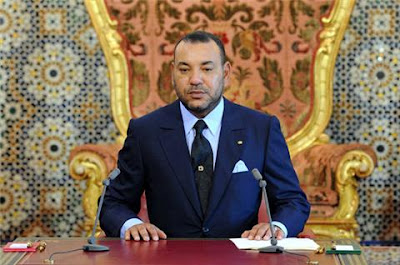King Mohammed VI of Morocco New Constitution Reform Speech June 2011
Morocco's king has announced a series of proposed changes to the country's constitution, including amendments that would strip him of some of his political powers.
Video
The changes, announced by King Mohammed VI in a live address to the nation on Friday, will be put to a referendum on July 1.
video
"We have managed to develop a new democratic constitutional charter," the king said, adding that the constitution "
enshrines a citizenship-based monarchy".
The proposed amendments would provide for the strengthening of the authority of the country's prime minister and parliament.
The prime minister would become the "president of the government", and would be able to appoint government officials - an authority previously held only by the king.
The new "president of the government" would also be able to dissolve parliament, the king announced, another role previously accorded only to Mohammed VI.
"We encourage a parliamentary authority that is ready to make sure that parliament makes final legislative decisions," he said. "This parliament has the ability to question any official in the country."
However, the king would remain a key power-broker in the security, military and religious fields.
'Defusing public anger'
Nabila Ramdani, a writer and analyst on North African issues, told Al Jazeera that the address was an attempt by the king to defuse popular anger in the country.
"There are bleak socio-economic conditions in Morocco, as well as a lack of fundamental human rights, and he is trying to avoid an expression of the anger we have seen on the streets of many Arab countries," she said.
"There is also a gap between how the world views Morocco, and the largely dismissed internal problems of illiteracy, corruption, and unemployment."
The king's speech comes in the wake of nationwide pro-reform demonstrations that began in February, inspired by other popular uprisings across North Africa and the Middle East.
"His powers have been reduced significantly in the sense that he is only the supreme leader of the armed forces and the commander of the faithful," Lahcen Hadad, a member of the country's governing coalition, told Al Jazeera.
"Most of the executive powers and judiciary powers are given to other bodies so that is an important change - the king has accepted to share the power," he said.
But he said there were no groundbreaking changes included in the speech. "I think that if you read the actual constitution and what he has announced now, there were no revolutionary reforms that he is announcing."



Comments
Post a Comment